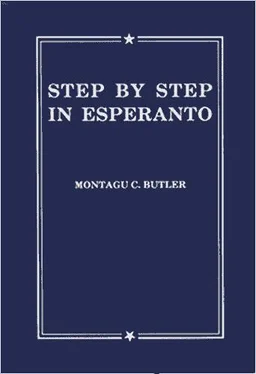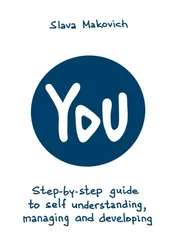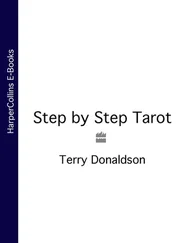234. Sing during your work (while you work). Don’t sleep during his instruction (while he is teaching). Be good during my absence (while I am away). Don’t talk during her song (while she is singing). During our game (while we play). During his silence (while he is silent).
235. Dum la tutanokto ( all through the night). … aŭtuno (horo, jaro, printempo, somero, tago, tempo, vintro, vivo).
236. If a noun ends with ‑J,so also must any adjective describing it. In the singular, therefore, we get ‑A ‑O;in the plural ‑AJ ‑OJ.Think of twins dressing alike; if one wears a red hat, the other does so too. In other words: the adjective must “agree” with its noun: both must be singular, or both plural. Thus: grizA harO, a gray hair; grizAJ harOJ, gray hairs.
bluA florO
bluA florO
------------
bluAJ florOJ
The sounds AJ OJare heard in my boy. They must be clearly pronounced, but light, and not accented. Thus, in grizaj harojaccent griz, har.
237. (a) Modelo: Verda kampo, verdaj kampoj. Granda seĝo. Alta muro. Bela sinjorino. Ronda tablo.
(b) Complete the following in the singular (‑a‑o), and in the plural (‑aj ‑oj), and translate. Interes- histori‑, ord- ĉambr‑, mallong- ĉapitr‑, mol- man‑, honest- knab‑, soif- bird‑, malbel- vizaĝ‑, idiot- person-.
Make similar pairs for yourself.
(c) Modelo: Unu verda libro kaj unu verda libro estas du verdaj libroj. Unu saĝa viro … Unu pajla ĉapelo … Unu dolĉa pomo … Unu ĉarma fraŭlino … Unu nova vorto …
(d) Polite children, ordinary people, high prices, clean faces, modern methods, deep waters, long days, new words, blue eyes, dirty windows, soft cushions, loud words.
(e) Ne ekzistas silentaj literoj en la Esperanta alfabeto. Inter putrajpomoj estas elekto( choice ) malgranda. Bonaj kalkuloj, bonajamikoj ( Short reckonings make good friends ).
238. la flor Oestas blu A, the flower is blue
la flor OJestas blu AJ, the flowers are blue
Make similar sentences from roots in 237.
239.
li estas bonA mi estas kontentA
ŝi estas bonA vi estas kontentA
--------------- ------------------
ili estas bonAJ ni estas kontentAJ
Talking to one lady, we say vi estas belA;to more than one, vi estas belAJ.
240. N.B. English changes the verb, but not the adjective: Esperanto changes the adjective, but not the verb.
mi estas riĉ a, I amrich
ili estas riĉ aj, they arerich
241. (a) Ambaŭ fraŭlinoj estas belaj. Parolo kaj faro estas aferoj malsamaj. Pagas maljunaj jaroj por junaj eraroj. Novaj sinjoroj — novaj moroj( manners ). Timo kaj entuziasmo estas infektaj.
(b) Kio estasverdaj? flavaj? ruĝaj? bluaj? nigraj? dolĉaj? grandaj? larĝaj? longaj? varmaj? utilaj? fidelaj?
(c) Put into the plural: La kastelo estas malnova. servanto … diligenta. viro … freneza. rivero … profunda. Complete: La infanoj (birdoj, hundoj, kantoj, violonoj, floroj) estas …‑aj.
242. In summer the days are long: in winter they are short. The boys are noisy, but the girls are quiet. The father and the mother are happy. Although we are poor, nevertheless we are honest. Good pupils work, bad pupils are lazy. Are you ready? (a) to one person. (b) to several.
243. Like other adjectives, the possessives (224)also take the plural. Thus: viAJ rozOJ, your roses.
244. Modelo: Miaj manoj estas malpuraj. Your eyes … His ears … Her hair(s) … Your pencils … Their friends …
245. ALIAJ libroj, other books ( k.a.= kaj aliaj, and others )
DIVERSAJ libroj, various (sundry, different) books
KELKAJ libroj, some (a few, several) books )
MULTAJ libroj, many books
MALMULTAJ libroj, few books
PLURAJ libroj, more than one book
246. (a) Place aliaj, diversaj, kelkaj, malmultaj, multaj, before each of the words aferoj, homoj, lingvoj, vortoj, and translate.
(b) Floroj estas tre diversaj. Multaj floroj estas blankaj; kelkaj estas ruĝaj; aliaj estas bluaj; sed malmultaj estas nigraj. Ni estas kelkaj, kvankam ni estas malmultaj. Ni ne estas la solaj en la mondo: ekzistas multaj aliaj.
(c) Some people (homoj or personoj) are rich, others are poor; some are tall, and others are short. The eyes of many men are brown; the eyes of some are black; of others blue. Many tables are oblong; some are round or oval, others are square; only few are triangular. Various papers. Sundry places. Divers(e) details.
(d) Aliaj domoj, aliaj moroj. Aliaj tempoj, aliaj moroj. Inter miaj muroj estas miaj plezuroj.
247. Diversaj difinoj. Du longaj pordoj sur la kapo. Letero kun vortoj belaj, sed ne veraj. Maldikaj objektoj sur la kapo: longaj sur la kapo de poeto, sed mallongaj sur la kapo de moderna sinjorino ( oreloj, amletero, haroj ). Kongreso: multaj homoj en granda ĉambro sidas, parolas, kaj ne komprenas. Esperanta Kongreso: Sama, sed komprenas.
248. Ludo. Mia kato estas Afabla, Bela, Ĉarma … ( Varianto:Miaj katoj estas afablaj …).
249. Tio estas tablO (kiO? tablO)
La tablo estas brunA (kiA? brunA)
La tabloj estas brunAJ (kiAJ? brunAJ)
250. KIAJestas la poemoj de Shelley ( What are S’s poems like )? (Answer KIAJwith AJ). Ili estas bel aj(ideal aj,etc.)
Kiaj estas laAnglaj fraŭlinoj? Londonaj stratoj? vintraj tagoj? modernaj bildoj? pomoj nematuraj? personoj en la ĉambro? Jen kiaj ni estas. Ni ne estas homoj TIAJ.
251. (a) Kiukoloraj (kiaj) estas tomatoj? bananoj? tulipoj? ĉokoladoj? la okuloj de …? la vestoj de …? la dentoj de krokodilo?
(b) Kiaj estas miaj lipharoj? viaj fratinoj? liaj brakoj? ŝiaj haroj? niaj lernolibroj? iliaj paĝoj?
(c) Kiaj bestoj estas hundoj? azenoj? Kiaj floroj estas peonioj? Kiaj mebloj estas la seĝoj en la ĉambro? Kiaj homoj estas miaj lernantoj?
(d) Ĉu la du libroj (knaboj) estas similaj?
The «kies» Family (Possession)
252. -ES= “…on e’s” . (Cp. poss essive, on e’s . Ger. w essen. ) Kies= de kiu(singular or plural).
• KIES, whose, of whom, of which. .
• TIES, that one’s, of that one, of those (over there) .
• IES, someone’s, somebody’s, of someone or other.
• ĈIES, everyone’s, everybody’s, of all.
• NENIES, no-one’s, nobody’s, of no-one.
Читать дальше












